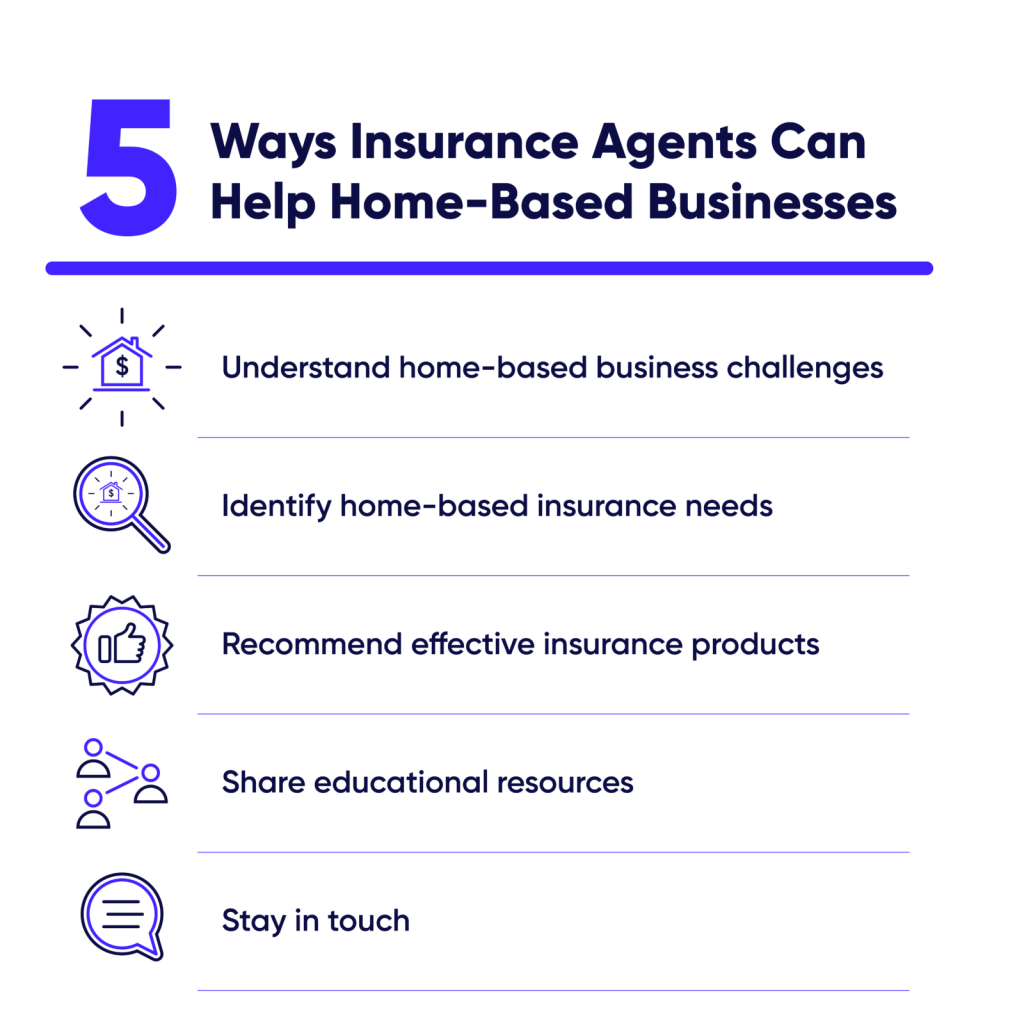In the United States, nearly half of all businesses with no employees are home-based and of those with employees, 24% are home-based, according to the Small Business Administration. Despite the popularity of home-based businesses, more than 40% lack insurance for small business owners.
The resulting underinsurance leaves many home-based businesses exposed to significant risks that could cripple their success and growth. Insurance agents can help home-based businesses by filling this gap, demonstrating the importance and worth of custom-tailored insurance solutions for small business owners—and the value of nurturing a relationship with your clients.

1. Understand home-based business challenges
Home-based businesses are unique. Even competitors within the same industry can differ in their approaches, structure, and offerings. This means there’s no one-size-fits-all insurance solution for small business owners who need and want to protect their home-based businesses.
It also means it’s challenging for small business owners to find insurance coverage on their own. Because their business isn’t necessarily a cookie-cutter copy, there are significant benefits to the advice and guidance you can offer.
But that requires you to ask questions about what they do and how they do it to identify the risks they’re most exposed to. Start by asking if the business:
- Has any employees and if they’re full- or part-time
- Operates entirely within the home or in other locations
- Involves meeting with clients and customers on-site or in-person
- Requires or uses specialized equipment or tools
- Maintains processes to document and resolve accidents and issues
Home-based businesses aren’t immune to big litigation, with 53% of small businesses dealing with lawsuits every year. After all, a home-based business owner doesn’t need to be a millionaire to get sued like one, so understanding your client’s unique risks can help you recommend ways to mitigate the impact of a potential lawsuit or other loss.
2. Identify home-based insurance needs
Home-based business owners struggle to understand insurance policies and concepts. This complexity and confusion can make it difficult to purchase sufficient insurance for small business owners, leaving them exposed to potentially significant risks.
You can tap into your expertise and knowledge to identify the insurance needs of a specific home-based business. Doing so can help small business owners bridge their insurance coverage gaps and reduce their risk exposure.
This also helps position you as an expert—someone who can make sense of otherwise complex insurance concepts.
For example, your new client might be covered by a Business Owners Policy, but they might still be exposed to other risks. Or their policy might not provide as much coverage as is necessary.
Identifying the needs of your home-based business client can help you recommend effective insurance for small business owners that:
- Covers any insurance gaps, including underinsurance
- Protects the home-based business from employee or client claims
- Provides coverage from cyber-crimes and data breaches
- Reduces the impact of potential interruptions to regular business
By working together with the owner or stakeholder of a home-based business, you can develop a tailored approach that provides effective insurance for small business owners.
3. Recommend effective insurance products
Though it’s important for you to sell insurance for small business owners, you need to make sure the products you recommend are beneficial, effective, and relevant.
Remember, too, that home-based businesses often have more unique needs than other small businesses.
Some home-based business owners might be able to get away with endorsements to their homeowners policies. Others—particularly those past their infancy—might need standalone insurance for small business owners or a BOP.
Look past the “standard” risks, too. Is a client using a vehicle primarily for business purposes? Is a client’s ability to earn an income at risk if normal business operations are interrupted?
Once you’ve determined the home-based business insurance coverage that your client needs, use tools like Coterie’s dashboard to instantly bind policies with real-time underwriting. This can help home-based businesses get up and running instantly, ensuring they’re protected against the everyday risks they’re exposed to.
4. Share educational resources
Maintaining insurance for small business owners can be challenging, particularly as a home-based business continues to grow and evolve. And as much as you make yourself available to your clients, they still need to understand what coverage they have and how to offset new or increased risks.
In general, consumers feel they lack insurance literacy, even when it comes to less complex types of insurance (like life and health).
You can provide a lifeline—and foster a strong relationship—by sharing educational resources with your home-based business clients.
Curating these types of insurance resources helps:
- Provide content relevant to your client, their industry, and the complexity of their specific situation
- Explain the importance of carrying a particular type of insurance for small business owners
- Outline recent changes to your client’s industry, risk trends, and other current events
- Prioritize an industry-specific focus during the quoting process
Don’t forget to send resources from your agency and its partners. Use these resources—like blogs and podcasts—to send over guidance about filing a claim or identifying risks, helping your clients stay informed and up-to-date with both their industry and the extent of how you can help them.
5. Stay in touch
When you sell insurance for small business owners, relationships are key. This is especially important for home-based businesses that lack the revenue for lawyers and other advisors, or that are run by owners unfamiliar with navigating the business world.
These individuals need your guidance and support on an ongoing basis.
Unfortunately, this is an area where insurers and agents fail. According to the 2021 J.D. Power U.S. Small Commercial Insurance Study, customer satisfaction with carrier interaction declined by 15 points between 2019 and 2021. Similarly, customers had to exert three times as much effort to interact with their insurance agent in 2021 compared to 2020.
In addition to sending over educational resources, check in on your clients. This allows you to evaluate the growth of their home-based business to point out any new risks—and how to mitigate them.
It also helps you identify any issues before they contribute to significant customer dissatisfaction. If a client doesn’t understand their policy, is upset about why a loss wasn’t covered, or is having billing difficulties, frequent check-ins can help you resolve these issues and retain your client.
Maintaining solid relationships with your clients can also impact your reviews. As a result, you can attract more business by serving as a helpful, client-oriented agent.
Don’t overlook the commercial insurance needs of home-based businesses
Agents can help home-based businesses by offering effective and versatile insurance for small business owners. Begin by understanding their needs and identifying their risks. Then, recommend insurance products that meet their needs and provide the coverage their business requires.
Maintain a healthy and positive relationship with your home-based business clients by helping them stay up to date on trends and risks. Frequently evaluate their needs to ensure they have adequate protection and understand their coverage.
In other words, help home-based businesses by assuming the role of an advisor and guide. Unravel the mysteries of insurance in the eyes of your clients so they can focus on what they do best: running their businesses.





